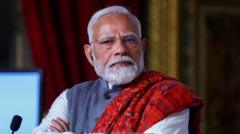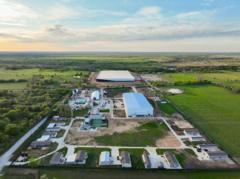As Prime Minister Modi prepares for his meeting with President Trump, both leaders are expected to discuss various pressing issues. These include potential trade agreements, energy collaboration, the status of high-skilled visas, and strategies for dealing with regional conflicts like those in Ukraine and Gaza.
Upcoming Trump-Modi Talks Set to Address Trade, Energy, and Global Diplomacy

Upcoming Trump-Modi Talks Set to Address Trade, Energy, and Global Diplomacy
Indian Prime Minister Narendra Modi is set to meet with President Donald Trump, focusing on trade tariffs, energy demands, and regional conflicts while navigating a complex relationship.
Prime Minister Narendra Modi's upcoming visit to Washington for discussions with President Donald Trump promises to be a blend of personal camaraderie and serious transactional engagement. Over the years, Modi and Trump have cultivated a close rapport, characterized by mutual interests in counterbalancing China's influence and strengthening U.S.-India partnerships. Their shared worldview has fostered a relationship marked by collaboration, despite Trump's occasional critiques of India.
During this visit, Modi is anticipated to meet not only Trump but also cabinet members, U.S. business leaders, and key figures from the Indian-American community. Among these may be high-profile industry leaders such as Elon Musk, who Modi may hope will consider establishing a Tesla factory in India, boosting the country’s burgeoning electric vehicle market.
Yet, while the atmosphere might seem friendly, underlying tensions regarding trade and immigration are likely to emerge. The Indian government has proactively taken measures to reduce tariffs, repatriate undocumented Indian immigrants, and increase purchases of American oil to placate U.S. demands. However, Trump may still press Modi for further concessions, particularly regarding tariff reductions aimed at mitigating the significant U.S. trade deficit with India, which was estimated at around $46 billion recently.
Moreover, Modi might leverage the talks to push for a bilateral economic partnership, potentially offering both nations a pathway to lower tariffs. This could stand in contrast to the previous Biden administration's stringent conditions on trade deals, indicating a willingness to negotiate under the Trump administration.
The delicate issue of deporting undocumented Indians, estimated to be over 700,000, may also arise, alongside calls for India to increase its American oil imports. The dynamics of global oil markets have shifted post-Ukraine conflict, prompting India to secure cheaper supplies from Russia, raising the stakes for how much American oil Modi may be willing to purchase.
On the energy front, Modi is expected to advocate for U.S. investments in India's nuclear energy ambitions as part of a broader strategy to meet half of its energy needs through renewable sources by 2030. This pitch aims to find common ground between clean energy pursuits and the Trump administration's limited interest in alternative energy sources like solar and wind.
Technology cooperation is also set to feature significantly in discussions, especially following recent advancements in the Initiative on Critical and Emerging Technologies (iCET). Modi will likely seek assurances from Trump and National Security Adviser Mike Waltz on continued commitment to this initiative, aimed at positioning India more prominently in global tech supply chains.
Additionally, visa issues, particularly the H-1B visa program benefiting a substantial number of Indian tech professionals, may present a point of negotiation, as pressure mounts from Trump’s supporters to reevaluate the program.
Geopolitics will also take center stage, with discussions expected around Iran, particularly concerning the Chabahar port project that India is developing as a strategic connection to Central Asia. Modi may ask for clarity on U.S. sanctions concerning this partnership while simultaneously addressing implications of the Biden administration's policies.
The complex dialogues will also likely touch on ongoing conflicts, such as those in Ukraine and Gaza, where Modi’s non-critical stance on Russia aligns with Trump’s policy perspectives. The potential for India to act as a mediator, if the context allows, could be explored during their talks.
Despite the serious nature of these discussions, both leaders are inclined to maintain a positive tenor throughout the meetings, particularly concerning initiatives like the Quad, which aims at collectively countering China's influence in the Indo-Pacific. Modi may even extend an invitation for Trump to attend this year's Quad meeting in India.
The upcoming talks between Modi and Trump may serve not only as a platform for addressing pressing bilateral concerns but also as a chance to deepen their strategic partnership against a backdrop of complex global challenges.






















